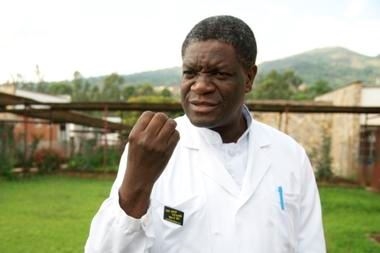 |
A woman arrived at the Panzi Hospital in the Democratic Republic of Congo (DRC) a few years ago weighing just under 62 pounds. Armed militants had murdered three of her eight children and her husband. The gunmen had repeatedly raped the woman, who as a result had become incontinent and infected with HIV.
For Denis Mukwege, Panzi’s founder and a savior to thousands of Congolese rape victims, the woman’s situation was hauntingly familiar. Dr. Mukwege is a renowned gynecologist who specializes in repairing the internal organs of women maimed by sexual violence.
“Everyday I operate on 10 women,” says Mukwege. “And there are hundreds more who are waiting.”
Mukwege and his staff at Panzi have treated more than 30,000 women, most of them survivors of sexual assault, since he opened the hospital in 1999. Since then, a vicious war that has displaced and killed millions of Congolese has officially ended – yet, every day, Mukwege meets more women with lives and bodies ravaged by violence.
The Democratic Republic of Congo is a central African nation with about a fourth the land area of the United States and a population of some 71 million. Armed insurrections and civil wars that began in the mid-1990s have devastated the country – particularly its eastern half, which borders Rwanda.
By 2007, nearly a decade after the start of a 1998-2002 war, as many as 5.4 million Congolese may have died from violence, disease, and hunger caused by the conflict, according to the relief group the International Rescue Committee. Children account for nearly half of the dead. Today more than 19,000 United Nations peacekeepers – the largest such UN force in the world – remain in the DRC.
As a young physician, Mukwege planned to work as a pediatrician. But when he saw one woman after another die from childbirth and other preventable causes, he changed his plans and traveled to France to study gynecology. Back in the DRC, Mukwege soon put his training to a new use: treating women raped by soldiers and armed rebels.
After the civil wars began, various armed groups started to use sexual violence as a weapon. Gangs of men raided villages and raped women and girls, brutalizing some with rifles and slivers of wood, and capturing others as sex slaves.
“It’s a strategy that destroys not only the victim; it destroys the whole family, the whole community,” Mukwege says. “It’s very efficient as far as destruction goes.”
Despite the 2002 peace accords, the sexual violence has continued. A 2011 report published in the American Journal of Public Health estimated that 1,152 women were raped every day in the DRC during a 12-month period between 2006 and 2007.
“Man has a tendency to behave in a deviant way,” when the social order collapses, Mukwege says. “And, unfortunately, the first victim is always the woman right beside him.”
Rape victims arrive at Panzi Hospital, in the city of Bukavu in the eastern DRC, with an array of severe health problems, including serious internal injuries. Some women are impregnated or infected with sexually transmitted diseases, including HIV.
Mukwege is a skilled surgeon. His hospital – whose services are free – also treats malnourishment and the trauma induced by rape and the intense stigma that accompanies it.
Women who have survived sexual assaults may face lifelong disabilities that limit their ability to work. Many are shunned by neighbors and abandoned by husbands. These lasting aftereffects render rape more potent than traditional weapons, Mukwege says.
When a loved one is shot and killed, he says, “You bury them, you cry. It takes time to heal, but you move on.”
But rape is different, Mukwege says. “How can you tell that woman, ‘What happened to you was in the past, now move on’?”
Mukwege worries that after so many years of lawlessness in the DRC, rape has congealed into a social norm. To counter this, he has publicly challenged the Congolese government to prosecute rapists in the military and civil society.
“The way of war can become a way of life,” says Margot Wallström, the UN’s Special Representative on Sexual Violence in Conflict. “[Mukwege] calls upon government and all actors to be accountable, to do the right thing, and to start to turn things around.”
Mukwege has also urged world leaders to do more to stop the rape epidemic. He recently discussed the issue with UN Secretary-General Ban Ki-moon and US Secretary of State Hilary Clinton.
“On one side, I feel that there’s an international recognition of what’s happening,” Mukwege says. “But on the other hand, very little is done to stop it.”
To treat and defend Congolese rape victims can be daunting work. Many of Mukwege’s colleagues have been overwhelmed, he says, by their patients’ nightmarish stories of abuse and suffering. Mukwege himself has received death threats on account of his work.
But Mukwege and his staff – who together treat about 3,600 women a year – have also been widely lauded for their efforts. This May, for instance, the King Baudouin Foundation, a Belgian philanthropic group, awarded Mukwege a prize worth $210,000.
The work also offers more profound rewards.
After months of treatment, the rape survivor and mother of five who entered Panzi deathly ill and malnourished finally was discharged. On that day, she weighed 132 pounds – more than twice her weight when she arrived.
Back on her own, she used a $50 grant from the hospital to start a small business. Soon she had earned enough money to build a house for her family, send her children to school, and even buy a small TV.
Mukwege cried when he saw her transformation. “My God, what strength,” he says, “what strength.”
Page created on 8/13/2014 10:29:31 AM
Last edited 1/6/2017 6:06:26 PM
